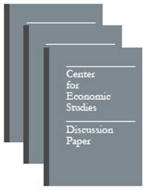Trade Liberalization And Labor Shares In China
Trade Liberalization And Labor Shares In China
Working Paper Number: CES-14-24
Abstract
We estimate the extent to which firms responded to tariff reductions associated with China’s WTO entry by altering labor’s share of value. Firm-level regressions indicate that firms in industries subject to tariff cuts raised labor’s share relative to economy-wide trends, both through input choices and rent sharing. Labor’s share of value is an estimated 12 percent higher in 2007 than it would be if tariffs had remained at their 1998 levels. There is significant variation across firms: the impact is larger where market access is better and it is influenced by union presence and state ownership.
Page Last Revised - October 8, 2021




